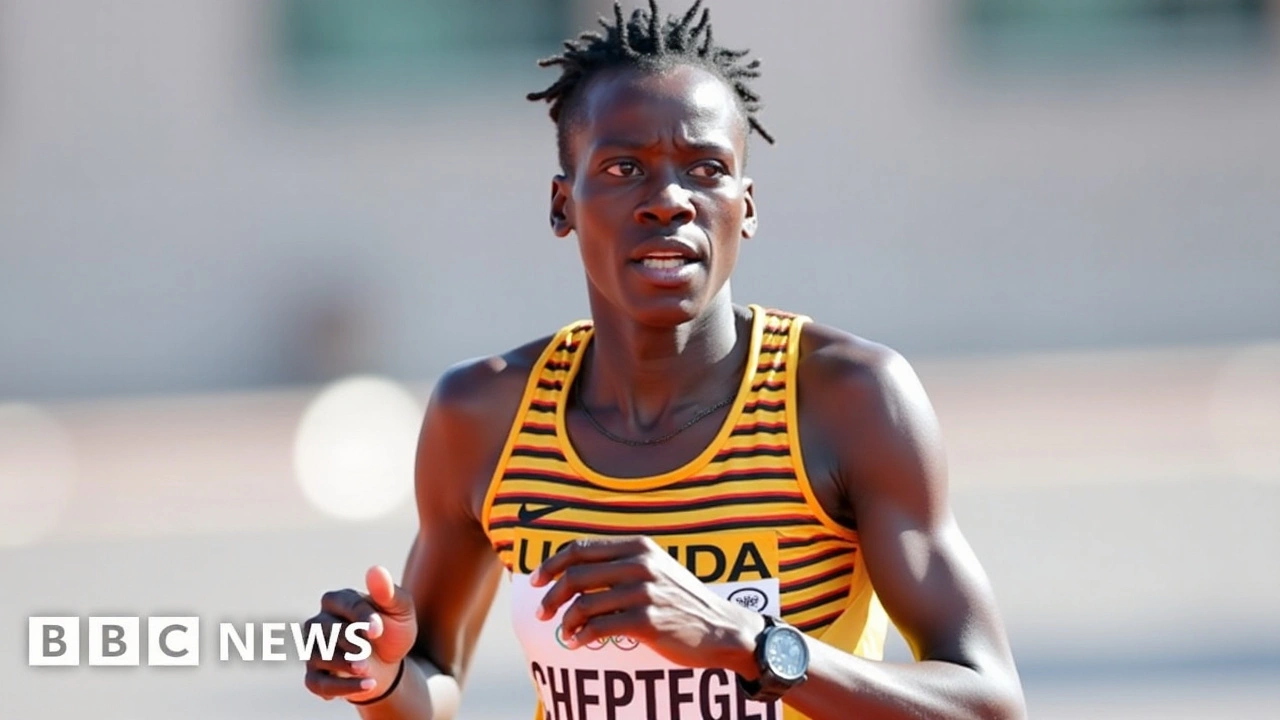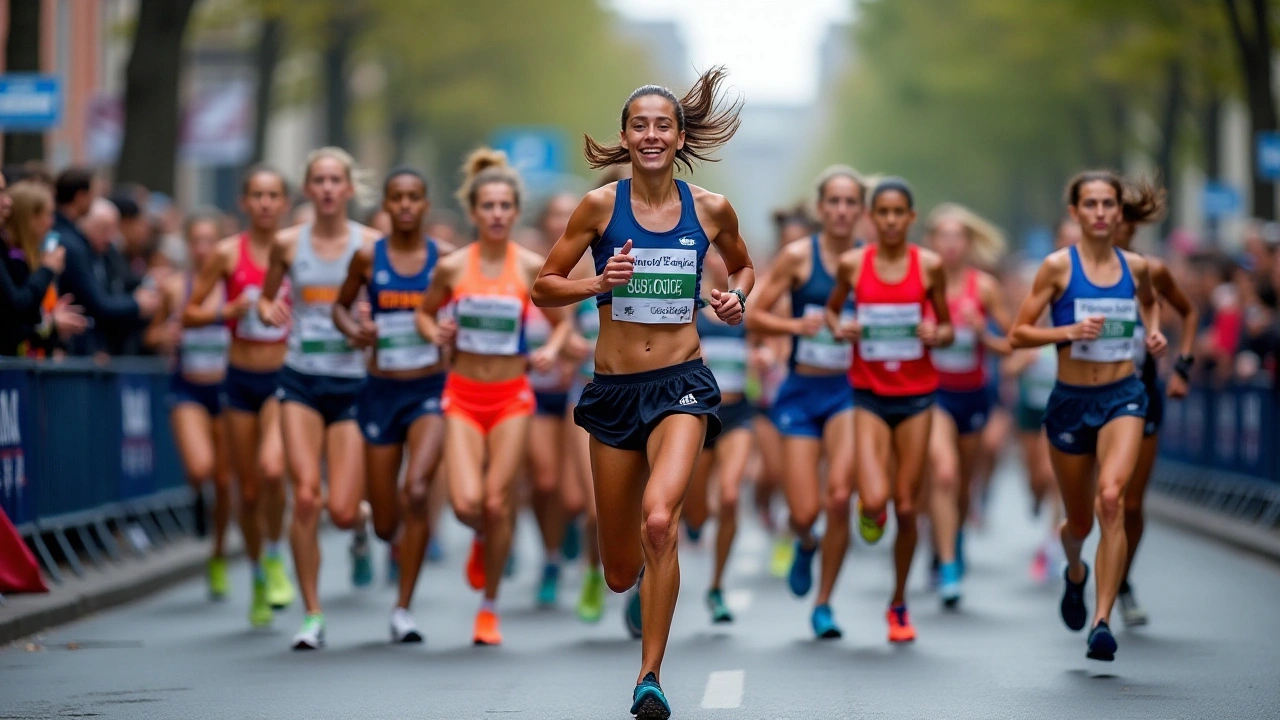The Tragic End of Rebecca Cheptegei
The sports world was rocked by the untimely demise of Ugandan Olympic marathon runner Rebecca Cheptegei. At the age of 33, Cheptegei, who showcased her athletic prowess in the 2024 Paris Olympics, met a grievous end after a violent altercation with her former boyfriend, Dickson Ndiema Marangach. The incident took place in her residence in Trans Nzoia County, Western Kenya.
According to local authorities, the argument between Cheptegei and Marangach escalated over a property dispute. In a horrifying turn of events, Marangach doused the athlete in petrol and set her on fire. The attack inflicted life-threatening burns covering more than 75% of her body. Despite being rushed to the Moi Teaching and Referral Hospital in Eldoret, Kenya, she succumbed to her injuries at 5:30 a.m. on Thursday due to organ failure, as confirmed by Owen Menach, the hospital's senior director of clinical services.
This tragic incident is not just a personal loss for her family and friends but also a grim reminder of the dangers of gender-based violence that plague many societies. For many, Rebecca Cheptegei was more than a marathon runner; she was a spirited individual who reflected the tenacity and spirit of athletes everywhere. Her death casts a shadow on the sports community, which has struggled with similar tragedies in recent times.
A String of Violence in the Athletic Community
Cheptegei’s death isn’t an isolated event. It's the third high-profile case involving the death of a female athlete in Kenya since October 2021. In a shocking parallel, the athletic world recently mourned Olympian Agnes Tirop, who was found deceased with multiple stab wounds in October 2021. Similarly, in April 2022, distance runner Damaris Muthee was discovered strangled. These series of events underline an urgent crisis of gender-based violence in Kenya, emphasizing the vulnerability of women, even those who attain international acclaim.
The pattern of violence against women athletes has ignited fervent calls for urgent interventions. Domestic violence continues to be a pervasive issue in Kenya and beyond. According to 2022 government data, nearly 34% of women in Kenya have experienced physical violence. Rebecca Cheptegei’s demise further highlights the pressing necessity for both grass-root and systemic changes to protect women from such atrocities.
Reactions from Authorities and the Community
The reaction to Cheptegei’s untimely death has been one of universal condemnation. Sports officials and government ministers from both Uganda and Kenya have voiced their shock and indignation. Uganda's Sports Minister Peter Ogwang called for justice, stressing the need to ensure that such heinous acts do not go unpunished. Similarly, Kenya's Sports Minister Kipchumba Murkomen joined the chorus of voices calling for an end to gender-based violence, emphasizing the need to create safe spaces for female athletes.
Beyond the governmental sphere, numerous organizations have intensified their campaigns against domestic violence. Among them is Tirop’s Angels, an initiative founded in memory of Agnes Tirop, aimed at combating gender-based violence and providing support to victims. Cheptegei’s death has strengthened their resolve, as they advocate for more profound and sustained actions to stop the cycle of violence.

Athlete and Humanitarian Remembered
Rebecca Cheptegei wasn't just an athlete; she was a beacon of hope and generosity. Those who knew her describe her as a supportive figure in the athletics community, often going out of her way to help fellow runners financially. Her death strikes a chord not only because of its brutality but also because of the profound loss felt by those who looked up to her.
Funeral arrangements are underway to transport Cheptegei’s body back to Uganda, where her family and the athletics community intend to give her a burial befitting her stature. The void left by her passing is palpable, as friends and athletes remember her fondly for her warm personality and enduring kindness.
The Broader Issue of Gender-Based Violence
The tragic end of Rebecca Cheptegei’s life has reignited discussions about gender-based violence, which remains a significant issue in many parts of the world. In Kenya, efforts to tackle this problem have seen mixed success. While there are laws in place to protect women from violence, enforcement remains a challenge. Cultural attitudes and societal norms further complicate the issue, often discouraging women from coming forward with their experiences of abuse.
Advocates argue that beyond legislation, there needs to be a shift in societal attitudes towards women and violence. Education and awareness campaigns are critical in changing mindsets and empowering women to seek help. Community-based organizations also play a vital role in offering support and resources to victims of domestic violence.
Call for Unified Action
As the world mourns another lost life, there is a renewed sense of urgency to address and eradicate gender-based violence. The loss of Rebecca Cheptegei, along with other athletes who have met similar fates, serves as a stark reminder of the dangers women face daily. It is a call to action for governments, communities, and individuals to work together in creating safer environments.
Rebecca Cheptegei’s story is a powerful testament to the impact of unresolved domestic disputes and the urgent need for intervention. The world of sports has lost a shining star, but her legacy might inspire the changes needed to prevent such tragedies in the future. Her death underscores the importance of safeguarding the lives of women, irrespective of their status or achievements. The call for justice for Rebecca is not just about punishing her attacker but taking concrete steps towards ensuring that no other woman has to suffer a similar fate.


Author
Ra'eesa Moosa
I am a journalist with a keen interest in covering the intricate details of daily events across Africa. My work focuses on delivering accurate and insightful news reports. Each day, I strive to bring light to the stories that shape our continent's narrative. My passion for digging deeper into issues helps in crafting stories that not only inform but also provoke thought.